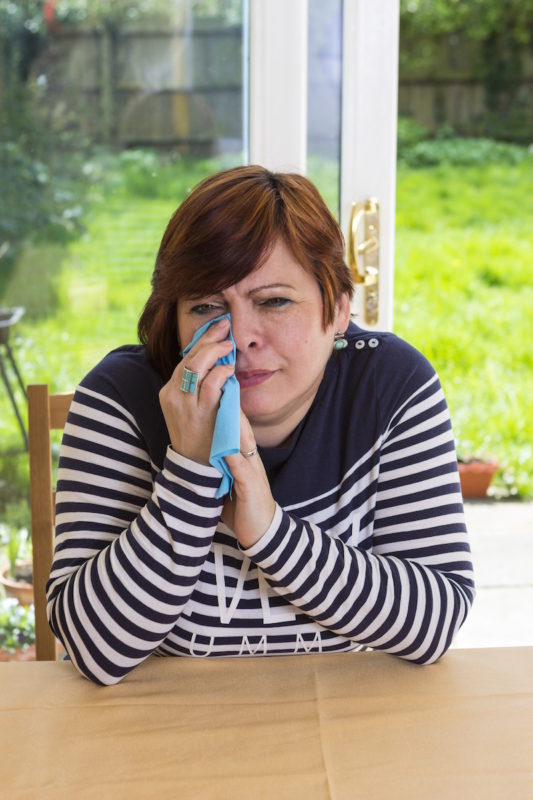Lorelie Rozzano is a guest blogger for Vertava Health.
Do Addicted People Realize The Pain They Cause Their Families?
A distraught mother recently reached out to me. Karen – not her real name – claimed she’d been beat up. She acknowledged the beating wasn’t physical, but something far more insidious. Karen states she was losing the war on her son’s addiction. She was exhausted. But that wasn’t all. Karen said she was on the verge of a nervous breakdown. If you’ve walked in Karen’s shoes, you’ll understand her struggle. Karen wanted to know if active addicts or alcoholics realize the pain they inflict on their families. Or do they believe they are only hurting themselves? Karen is trying to understand her son’s behavior and lessen the impact his choices have on her. Karen wonders if her son even knows he’s lying. Or worse yet, if he even cares. Karen isn’t alone in wondering this. Many families struggle to absorb the hurt and confusion one feels when dealing with their addicted loved one. Just as addiction progresses so does the family’s response to it. At first, the family will want to jump in and rescue, fix or save them. But eventually, they understand, they can’t. It’s the process between trying to help their addicted loved one and concluding they can’t, that’s often described as hell. While I was actively using, I rarely thought about the pain I caused my family. Not because I didn’t love them. It wasn’t that personal. The need to get high was greater than my conscience. I was driven by a force more powerful than me. Although I looked and sounded the same – at least at first – I wasn’t the same at all. My disease had compromised everything good and loving about me. In return, I became manipulative, abusive and ugly. My main focus was getting more. More drugs, more money, more lies, more drugs. It was a never ending cycle of more. And a full-time job feeding and protecting my habit. Addiction is a demanding mistress. It’s seductive, secretive and extremely cunning. The impact of this disease is so great that family members seek to make sense of it. This is where families can step out of reality. While the addicted person rationalizes using, the family begins to do the same. Excuses are sought. Justifications made. And intolerable and abusive behaviors become the new normal. Addiction doesn’t make sense. It’s an illogical, irrational brain disease that’s progressive in nature. It’s like jumping on a fast moving train. Destination: death. If you weren’t addicted and boarded this train by mistake, you’d jump off. You might get a few scrapes and bruises from your fall, but for the most part, you’d be okay. But those of us who are addicted don’t jump off. The thrill of the ride is exhilarating. We hang out of the train’s car by our fingernails, knowing any minute we might fall. The conductor shouts death is the last stop. But we don’t believe it. Death won’t happen to us. We’re in control. We got this. To understand the true nature of this illness, keep in mind the addicted person isn’t the only one on the train. Their family is also riding with them. This ride is fueled by crisis after crisis. It’s an arduous journey of pain and deception. Some family members will get fed up and jump off. But not everyone will. The primary enabler (the person in the family who is easiest to manipulate and has the toughest time saying no and setting boundaries) will stay on. Neither addicted person nor enabler notices the end stop hurtling towards them. The enabler tries to convince the addicted person to jump off. The addicted person tries convincing the enabler there’s no reason to jump off. Everything is just fine. The enabler refuses to jump. He/she is so busy trying to talk the addicted person off the train, they ultimately crash with them. When the family sacrifices their own wellness for the addicted person it is not noble. Playing the martyr only further enables this disease. Staying on the train with your loved one isn’t an act of love. It’s an act of codependency. Delusion is the key symptom of addiction. Delusion is the belief or impression that everything is just fine, despite the contradiction of what is really happening, or rational argument. It is typically a symptom of a mental health disorder. In response to Karen’s question; do active addicts/alcoholics realize the pain they cause their family? The answer is yes and no. At the beginning stages of my illness, I understood I was causing my family pain. I swore I would stop, but was unable to. Once you cross that line, everything else matters less. It’s important to remember your addicted loved one is not trying to hurt you on purpose. Deluded persons aren’t mentally sound. Addiction does damage on a cognitive, psychological, behavioral and emotional level. To repair the damage both parties, addicted persons and their family, need help. But there is good news. Addiction is very treatable. To step into your personal best, all you have to do is pick up the phone and call the number below. If you or someone you know needs help, please call this confidential support line for assistance. 844-470-0410.


